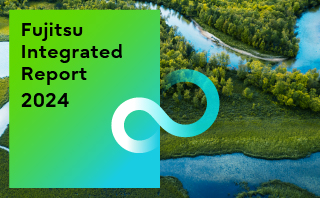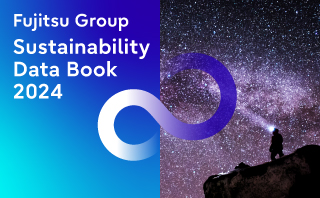-
Sustainability at Fujitsu Group
- Sustainability Management in the Fujitsu Group
- GRB(Global Responsible Business)Goals and Achievments for FY2022
- GRB(Global Responsible Business)Goals for FY2025
- Fujitsu's accessibility
- Stakeholder Engagement
- United Nations Global Compact
- SDG-related Activities in Fujitsu
- External Recognition and Awards
-
Global Responsible Business
- Environment
-
- Environmental Management
- The Fujitsu Group Environmental Vision on Climate Change
- Living in Harmony with Nature (Conservation of Biodiversity)
- Environmental Action Plan
- Environmental Data
- Environmental Communication
- Environmental Social Activities
- Disposal and Recycling of ICT products
- Environmental Considerations in ICT Products
- Governance
-
Data and Documents
- Fujitsu Group Sustainability Data Book 2024
- Social, Governance and Environmental data
- Independent Assurance Report

- GRI Standards / United Nations Global Compact (UNGC) principles Comparison Table
- SASB Standards Comparison Table
- Sustainability Information Disclosure Framework
- Link to regions responsible business reports
- Contact
- Sitemap
Help to resolve environmental challenges for customers and society through our business operations
- Comprehensive Optimization Through Next-generation Dynamic Supply Chain Management
- Connecting data and stakeholders with trust to solve customer business challenges
- Connecting land, sea and air logistics data to enhance efficiency, flexibility and business sustainability
- Contributing to sustainability through optimized energy use
- Energy Consumption Optimization Service
- Launch of trials for realizing a blue carbon measurement and verification business using maritime digital twinning as a key technology
Fujitsu’s business aims to transform its portfolio and offerings by 2030, focusing on ESG contributions and Sustainability Transformation (SX). In line with its materiality focus on solving global environmental issues, Fujitsu provides a range of cross-industry offerings, from supply chain optimization through to energy efficiency. Notably, we are promoting the development of solutions and initiatives that contribute to SX, targeting both customers and society as part of our Stage XI Environmental Action Plan for 2023 to 2025. Below are examples of Fujitsu’s initiatives for helping to resolve environmental challenges for customers and society through its business.
Comprehensive Optimization Through Next-generation Dynamic Supply Chain Management
Supply Chain Management (SCM) encompasses the optimization of processes from the procurement of raw materials for products through to manufacturing, distribution and sales. Today, all aspects of SCM are undergoing significant changes, demanding adaptation from businesses. Companies are facing a rapidly changing environment with new challenges, including heightened concerns for human rights, environmental protection, preparedness for future pandemics, and increasingly severe natural disasters that traditional SCM approaches are struggling to address. One key reason for this is the lack of integrated visualization and decision-making across the entire supply chain, hindering companies’ ability to make informed decisions. This highlights the urgent need for a transition to next-generation SCM that can respond to modern challenges quickly and flexibly.
Fujitsu provides Fujitsu Data Intelligence PaaS (DI PaaS) to realize business-specific AI. DI PaaS is a cloud-based all-in-one operation platform that integrates vast amounts of data from both inside and outside organizations into a meaningful format to support decision-making. It consists of four platforms: the world’s most advanced AI solution “Fujitsu Kozuchi”; the blockchain technology “Fujitsu Track and Trust” that enables traceability; Palantir Foundry for complex data integration, application development, and advanced AI; and data integration technologies such as Microsoft Azure. DI PaaS helps customers solve their challenges by enabling the integrated connection and analysis of data that has been fragmented across industries, leading to unprecedented cross-value chain solutions and insights. Furthermore, by seamlessly linking these decision-making outcomes with Fujitsu's long-standing planning and execution systems, DI PaaS empowers autonomous operation of business processes from decision-making to action, enhancing agility and responsiveness to change.
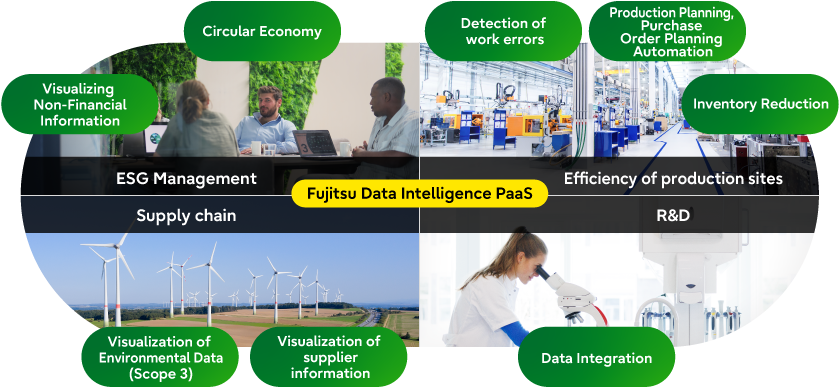 Fujitsu Data Intelligence PaaS
Fujitsu Data Intelligence PaaS
Connecting data and stakeholders with trust to solve customer business challenges
As people become more conscious of environmental and societal issues, companies are being asked to provide products and services that are not only functional and high-quality, but that also have low environmental impact and are produced and distributed fairly.
This is particularly true in EU countries where, based on the European Green Deal policy, almost all products distributed are subject to Ecodesign regulations as part of a circular economy action plan (excluding some EU countries). The implementation of the Ecodesign regulations is accompanied by a Digital Product Passport (DPP) that will become mandatory in a few years. As an inescapable feature of continuing to conduct business in Europe, these regulations require a range of responses, including customs clearance.
We deliver large numbers of products to consumers via supply chains that span the globe, but to address the various demands outlined above, it is crucial that we provide highly trustworthy levels of traceability to ensure transparency in the transactions between our various stakeholders.
Fujitsu Track and Trust provides a traceability platform that leverages consulting and blockchain technology to solve challenges in customer businesses by quickly testing hypotheses to enable further growth. By providing traceability, Track and Trust enables cost reductions and greater efficiency in implementing the processes involved in raw materials procurement, product manufacturing and the downstream logistics. It can also be used to boost corporate and brand value by disclosing the enterprise’s contributions to achieving the SDGs to customers (ESG reports).
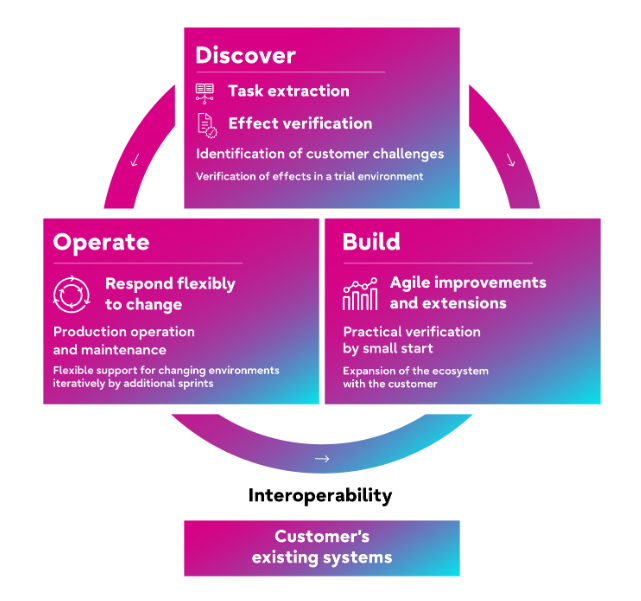 Fujitsu Track and Trust platform
Fujitsu Track and Trust platform
Connecting land, sea and air logistics data to enhance efficiency, flexibility and business sustainability
While logistics demand is forecast to increase, the logistics industry faces various challenges, including labor shortages, declining transportation capacity, diversification of transportation methods, and measures to reduce GHG emissions.
Fujitsu connects logistics information held by shippers and logistics companies through logistics data standardization services, enhancing efficiency, flexibility, and making business sustainable. It achieves both maximization of transportation capacity and reduction of GHG emissions through industry-wide operational efficiency, enabling resilient logistics that maximizes profits and can respond to not only natural disasters and conflicts, but also everyday changes.
Our approach to solutions
Resolving labor shortages: Optimize and standardize business planning and processes, and use forecasting as the basis for optimizing on-site operations in real time.
Improving transportation capacity: Optimize transportation equipment utilization plans based on cargo loading efficiency, relay efficiency, and future cargo volume forecasts.
Reducing environmental impact: Reduce GHG emissions by optimizing operational plans based on refueling/recharging plans, driving route selection and energy demand forecasts.
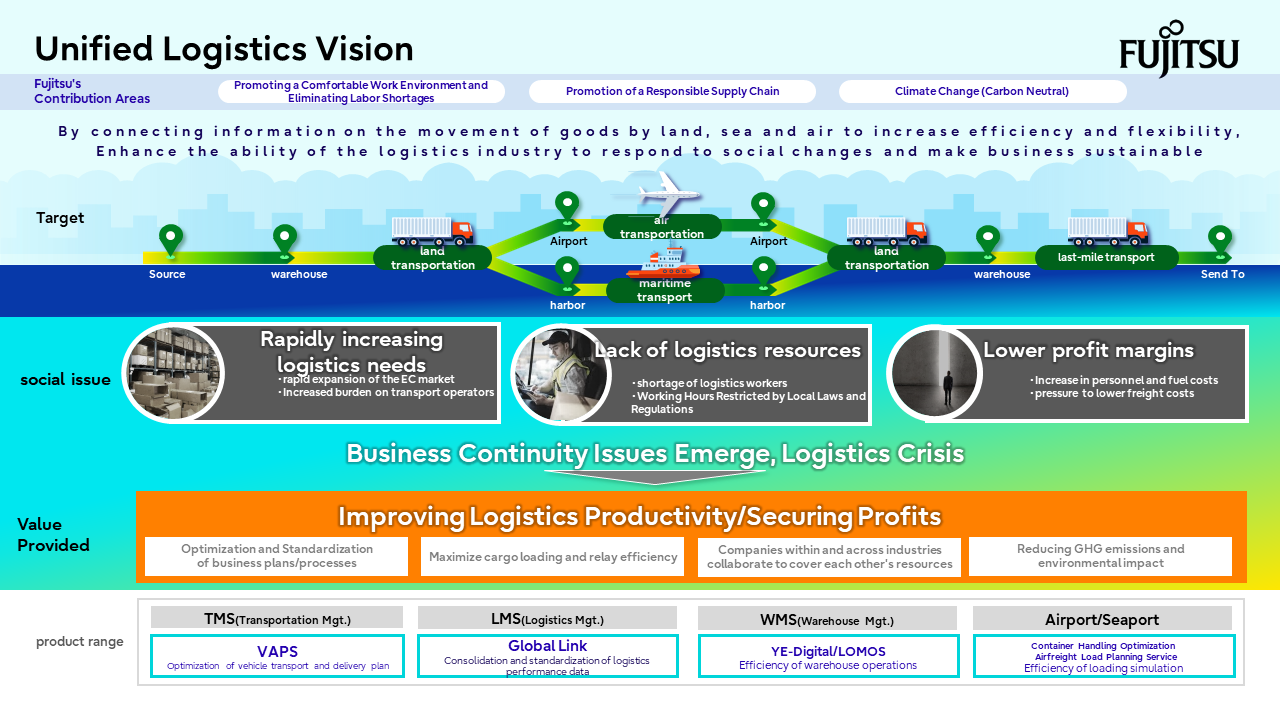 Unified Logistics
Unified Logistics
Contributing to sustainability through optimized energy use
The IoT Operations Cockpit supports rapid business decision-making by visualizing information acquired from various IoT sensors in real time, realizing reduced costs and environmental impact.
Service features
- Real-time visualization and analysis of energy usage
Visualizes data such as energy usage collected from various IoT sensors in real time. Allows information from multiple stores to be centrally managed on a dashboard. - Fault prediction and error detection using AI-based anomaly analysis
Learns from collected and stored sensor data, and then uses AI to conduct anomaly analysis and predict faults. Anomalies can also be detected by setting a threshold value, which allows for the identification of equipment requiring maintenance in advance and the ability to take preventive measures. - Contribution to sustainability through energy efficiency improvements
By visualizing the operating status of lighting, refrigerators and air conditioning, users can clearly identify areas requiring energy reductions, which in turn assists with the upgrading of infrastructure and operations. This supports reductions in wasted energy consumption and promotes environmentally friendly corporate activities.
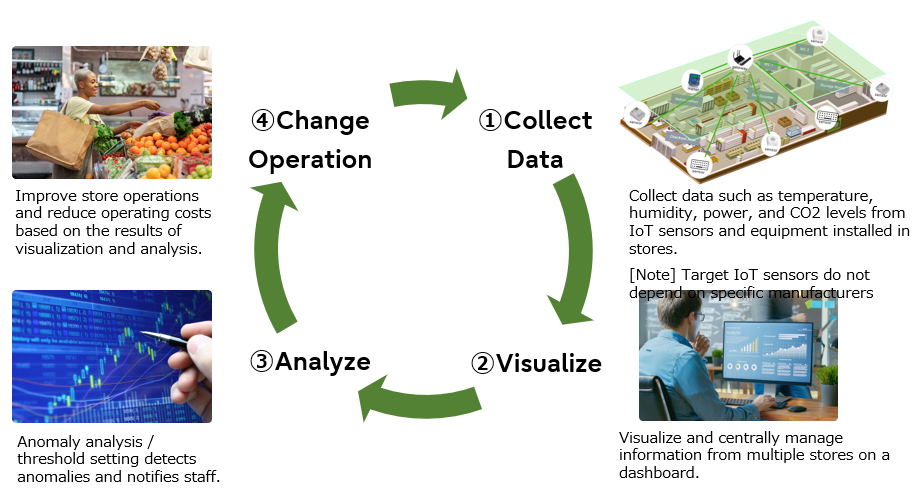 IoT Operations Cockpit
IoT Operations Cockpit
Energy Consumption Optimization Service
Fujitsu Energy Consumption Optimization powered by METRON is an end-to-end service that assists factories and offices in any industry sector to optimize their energy consumption, from energy data collection and visualization through to analysis and optimization.
In collaboration with METRON, we offer the four key services shown below aimed at accelerating the decarbonization of the manufacturing industry worldwide.
- Digitization Consulting: Energy Data Collection
- Energy Visualization SaaS: Energy Management/Analysis SaaS
- Energy Optimization Consulting: Energy Optimization
- Production Schedule Optimization: Energy x Production Schedule Optimization
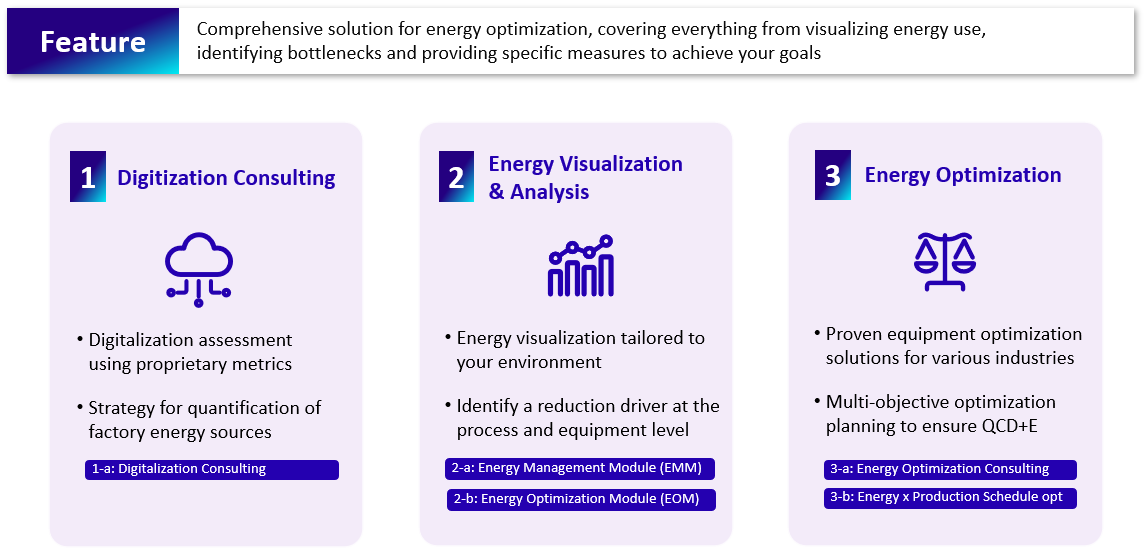 Fujitsu Energy Consumption Optimization powered by METRON
Fujitsu Energy Consumption Optimization powered by METRON
Launch of trials for realizing a blue carbon measurement and verification business using maritime digital twinning as a key technology
Fujitsu is conducting proof-of-concept trials on blue carbon (*1) measurement and verification technology, with the goal of commercialization. The waters of Japan, including its exclusive economic zone (EEZ), ranks sixth in the world and have the potential to realize up to 5,000 tons of CO2 reductions using blue carbon. This could be the trump card when it comes to CO2 reductions, since it surpasses the figure for the amount of CO2 absorbed by the world’s forests, which are declining due to the lack of people committed to their preservation. Furthermore, blue carbon has the advantage of being able to be traded in the market as J Blue Credits if it is applied for and verified. However, the creation of blue carbon has been a challenge due to the high cost involved in underwater operations. Fujitsu’s blue carbon measurement and verification technology dramatically reduces this high cost of underwater operations through ICT. Rather than the current method where large numbers of divers visually check the growth of multiple hectares of seaweed and then use mathematical formulas to make estimates, Fujitsu’s technology uses tools such as underwater drones to enable an AI to learn the underwater CO2 concentrations. Combining this with remote sensing for widespread measurement, enables highly precise calculations at a low cost without using divers. [Fig. 1]
The Fujitsu Laboratories Ocean Digital Twin is a key technology that reproduces the marine environment with high precision in a digital space. It can make predictions by using simulations of the changes in the environments that make up the ocean and the effects of ocean-based global warming countermeasures. This is achieved through the use of technologies such as AI and autonomous underwater vehicles (AUVs) that collect high-resolution 3D data of underwater organisms and structures [Fig. 2]. Through its blue carbon measurement and verification technology, Fujitsu is aiming to establish underwater digital twinning for seaweed beds by FY2026. As well as supporting blue carbon development, this is also working towards Sustainability Transformation (SX)(*2) by supporting proposals for initiatives such as measures by companies and local governments to protect biodiversity on coral reefs and to preserve and develop seaweed beds. Together with an external research organization(*3), we conducted verification testing for these technologies in the coastal waters around Ishigaki Island in Okinawa. We successfully collected highly detailed 3D data for coral reefs and confirmed the viability of the technologies. The results of this testing were very highly rated by the Ministry of Land, Infrastructure, Transport and Tourism (MLIT) and we were the first company to take part in seminars(*4) run by the Ministry. Our goal is to begin proof-of-concept trials during FY2024, and we are already laying the groundwork for collaborations with other companies. Our goals also include building partnerships with companies, local governments and other organizations to implement countermeasures aimed at achieving carbon neutrality, and supporting proposals for customers’ climate measures that use our blue carbon measurement and verification technology (and underwater digital twinning).
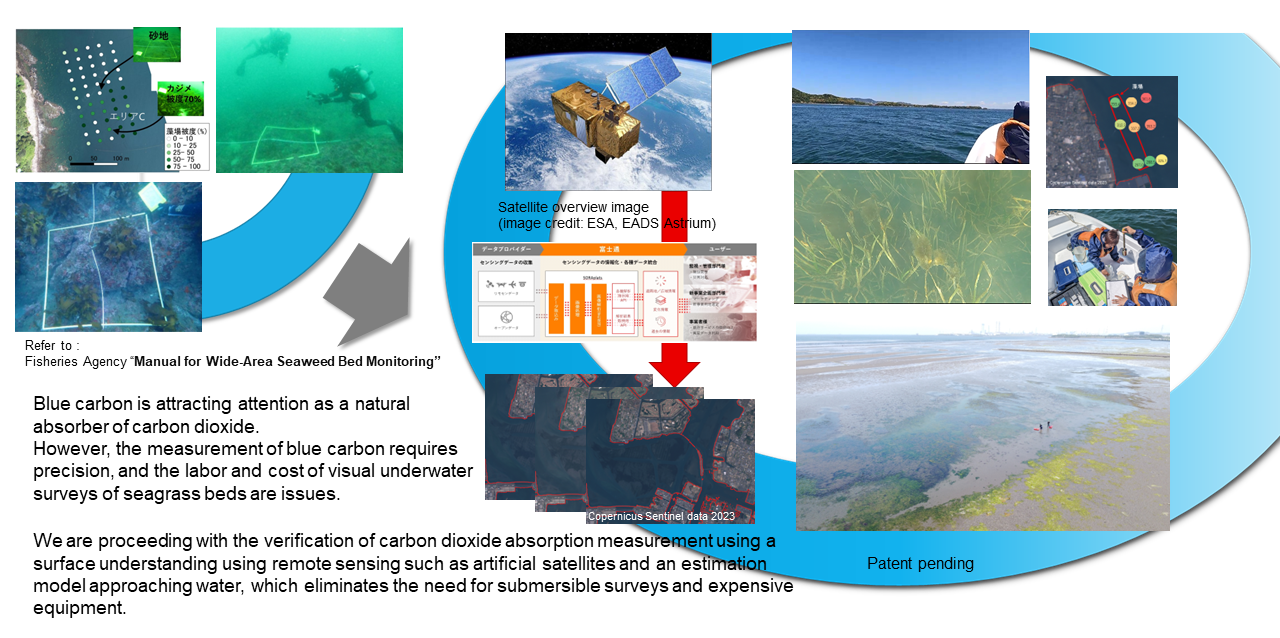 Fig. 1 Overview of diverless high-precision measurement
Fig. 1 Overview of diverless high-precision measurement
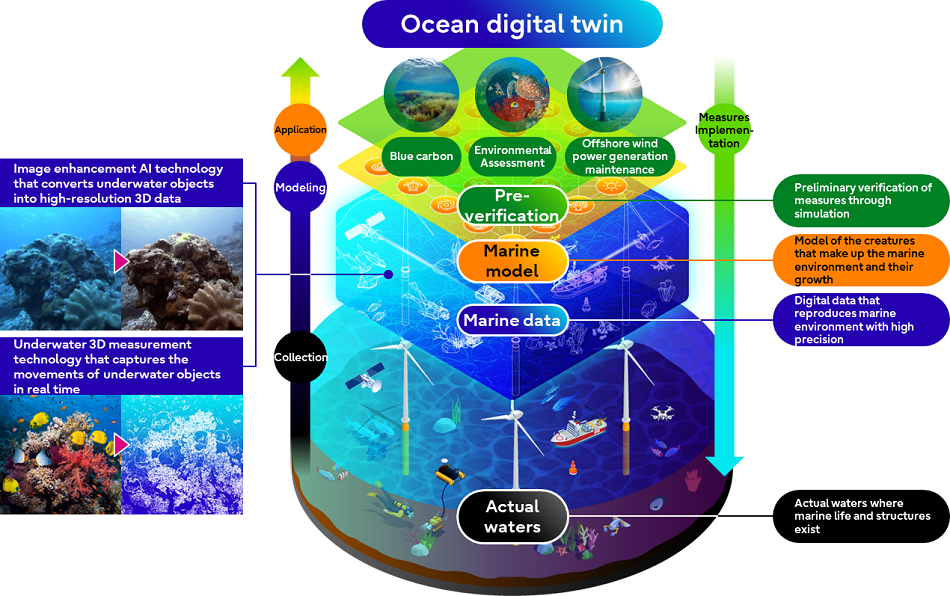 Fig. 2 Technology for collecting 3D data of underwater organisms and structures
Fig. 2 Technology for collecting 3D data of underwater organisms and structures
- *1Blue carbon refers to carbon that has been sequestered or stored through photosynthesis by marine organisms such as seaweed and seagrass.
- *2Sustainability transformation
- *3National Maritime Research Institute, National Institute of Maritime, Port and Aviation Technology (NMRI)
- *4Blue carbon data measurement manual seminar into the use and application of high-precision data acquisition and management systems for blue carbon
Business collaboration on platforms addressing international initiatives and societal challenges in Japan
Since early 2024, Fujitsu has worked with the Climate Group through its RE100 initiative by collaborating on proposals for policies and regulations that will enable companies in Japan to procure renewable energy. Fujitsu is one of 12 members on the Policy Working Group tasked with reviewing policies in Japan. The top-priority policies recommended by the RE100 members are listed below.
- Implement policies promoting transparent and fair electricity prices, aiming to improve the cost-effectiveness of renewable electricity generation and pricing.
- Improve access to Physical and Virtual Corporate Power Purchase Agreements (PPAs)(*5) by establishing streamlined processes and removing barriers for buyers and suppliers.
- Prioritize grid upgrades and operational improvements to speed up the connection time for new renewables projects and maximize usage of existing renewables to avoid curtailment.
In a public statement issued on 25 June 2024, RE100 participants consisting of over 420 of the world’s biggest and most influential companies, including 87 companies headquartered in Japan, strongly urged the Japanese government to set more ambitious targets for renewable energy installation. They demanded that Japan leverage the opportunities created by the transition to net zero to urgently increase its renewable energy generation capacity threefold (to 363 GW) by 2035 in the forthcoming 7th Strategic Energy Plan being formulated by the Japanese government.
Through this involvement, Fujitsu is both promoting renewable energy within the company and actively participating in campaigns to promote renewable energy throughout Japan. In doing so, we are contributing to the broader adoption of renewable energy across society and to business through the accompanying energy solutions.
Shortly after Fujitsu endorsed the “GX League Basic Concept”, released by the Ministry of Economy, Trade and Industry (METI) on February 1, 2022, we began cooperating in this initiative and have continued as active participants since the GX League(*6) became fully operational in FY2023. As of March 27, 2024, the league has attracted participants from a wide range of industries with 747 companies now involved, forming a framework that encompasses over 50% of Japan’s greenhouse gas emissions. We are also involved in the planning for the GX-ETS(*7), and as a GX League member, we publish status updates on the progress of various initiatives by each company on the GX dashboard. This includes our progress towards achieving our own emissions reduction targets, our efforts to reduce emissions across our entire supply chain, and the products and services we supply towards the creation of green markets. Our commitment is also reflected in our business activities, where we contribute to GHG emissions reductions throughout Japan by actively offering proposals for GHG emissions reductions to customers who are GX League participants.
- *5Power purchasing agreements undertaken between power suppliers and consumers where the transactions involve environmental value only
- *6A forum for cooperation between corporate enterprises, the government, universities and academic institutions engaged in similar initiatives aimed at achieving sustainable growth in the society of today and the future, rising to the challenges of GX while remaining focused on social reform and achieving carbon neutrality by 2050
- *7An emissions trading scheme in the GX League that is one of the market-based mechanisms aimed at reducing greenhouse gas emissions. The scheme works by setting a limit (cap) on emissions for companies and other organizations and discourages participants from exceeding that limit. Recent years have seen a greater focus on programs to introduce emissions trading as part of the GX League activities.
- RE100 Our work in Japan

- RE100 calls on the Japanese government to urgently grow renewables capacity

- GX League




